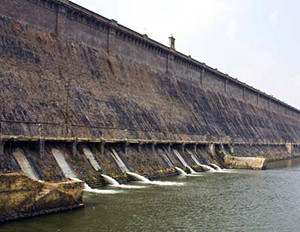New Delhi, Sep 20: Karnataka will have to release 6,000 cusecs of Cauvery water per day to Tamil Nadu from tomorrow till September 27, the Supreme Court said today while raising the quantum the fixed by the Supervisory Committee by 3000 cusecs.
The apex court also gave liberty to both states to file objections against the directions of the Cauvery Supervisory Committee yesterday, asking Karnataka to release 3,000 cusecs of water daily to Tamil Nadu between September 21 and 30.
A bench of Justices Dipak Misra and U U Lalit also directed the Centre to constitute within four weeks the Cauvery Water Management Board (CWMB) as directed by the Cauvery Water Disputes Tribunal (CWDT) in its award.
It also directed the Centre to produce before it on the next date of hearing, the notification indicating that CWMB has been constituted and said, if required, further direction can be passed by the apex court to the CWMB.
"How long will the two states keep fighting? This dispute is there from 1894. Cauvery Water Management Board (CWMB) is an expert body and it needs to be constituted. Just because the problem had not arisen earlier doesn't mean that the problem will never arise in future," the bench told ASG Pinky Anand, appearing for Centre.
The apex court took note of the fact that no consensus was reached among the states before the Supervisory Committee and Union Water Resources Secretary and Chairman of the Committee Shashi Shekhar used his power to ask Karnataka to release 3000 cusecs of water daily to Tamil Nadu.
Senior advocate and noted jurist F S Nariman, appearing for Karnataka, opposed the supervisory committee order and said the state was aggrieved by the order.
"We cannot give water to Tamil Nadu from our drinking water supply," Nariman said while opposing any interim arrangement for release of Cauvery water.
Senior advocate Shekhar Naphade, appearing for Tamil Nadu, also opposed the directions, saying the supervisory committee has not considered all aspects while passing the order.
He said the committee had failed to consider the fact that it was a rain deficient year and the quantum of water to be released has to be done proportionally.
"We need water here and now otherwise our Samba crops which are planted in August-September and harvested in December will be destroyed," Naphade said.





Comments
Give ... ALLAH will give U more...
Prophet Muhammad pbuh said : The upper hand is better than the lower hand..
The upper hand is the charitable hand whereas the lower hand is the Begging hand...
ALLAH knows well, So don't hold the water from giving it to needy...
Add new comment